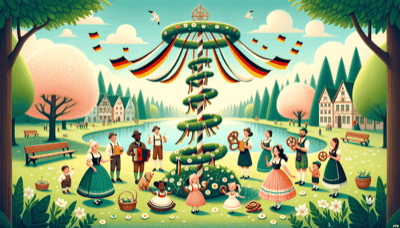We're here to help you keep count of the days to or since a date. Just click the button below and enter your chosen date to get started. Also choose the suggested days or search for a special day above #countingthedays

May Day, known as "Tag der Arbeit" (Labor Day), is a public holiday in Germany celebrated on May 1st. Its origins lie in the labor movement of the late 19th century, when workers began to protest for better working conditions and an eight-hour workday. The day was officially recognized as a public holiday in Germany in 1933.
Traditional celebrations include the erection of the Maibaum (Maypole), a decorated tree or pole that symbolizes the arrival of spring. Villages and towns often have their own unique Maibaum, adorned with ribbons, wreaths, and symbols representing local crafts or industry.
On May Day, Germans participate in various activities:
Labor Day Marches/Rallies: Trade unions organize demonstrations and rallies advocating workers' rights and social justice.
Festivities: Festivals with music, dance, and traditional food take place throughout different regions.
Maypole Celebrations: Communities gather to raise the Maypole, followed by folk dancing and local cultural events.
Walpurgis Night: The night before May Day, known as Walpurgisnacht, involves traditions similar to Halloween where people dress up and light bonfires to ward off evil spirits.
May Day is both a day of political action for workers' rights and a celebration of spring's arrival. It remains an important date on the German calendar with diverse local customs.